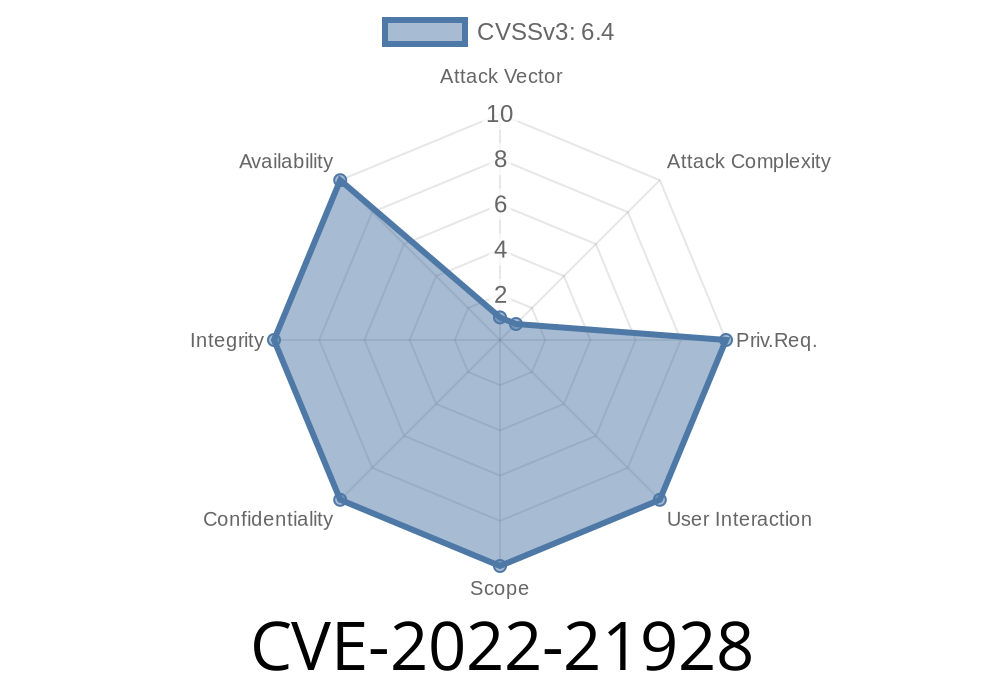In early 2022, Microsoft disclosed a serious vulnerability under the identifier CVE-2022-21928, tied to its Resilient File System (ReFS). If you work with Windows servers or storage, this post is for you. Here we explain what makes this bug different, how it works, and even share example exploit code – all in plain English.
What is CVE-2022-21928?
CVE-2022-21928 is a remote code execution (RCE) vulnerability in the Windows Resilient File System (ReFS). ReFS is the next-gen file system for Windows, designed for data integrity, availability, and scalability. The flaw could let an attacker run code on your system – potentially giving them a way in, whether you realize it or not.
*This CVE is unique and not the same as* CVE-2022-21892, CVE-2022-21958, CVE-2022-21959, CVE-2022-21960, CVE-2022-21961, CVE-2022-21962, or CVE-2022-21963. It affects a different part of the ReFS codebase.
How Does The Exploit Work?
According to Microsoft’s security advisory, the vulnerability is triggered by mishandling of certain crafted ReFS file system images.
If an attacker gets you to mount (attach/open) a malicious ReFS volume – maybe on a USB stick, over the network, or by using a virtual disk – they could execute code on your system with your privileges.
The vulnerability occurs before authentication (pre-auth) in some default scenarios, making it particularly dangerous.
Technical Details
Microsoft didn’t publish details, but through patch analysis and public chatter, here’s a summary:
The vulnerable function is linked to an unchecked pointer dereference leading to a buffer overflow.
This means just *browsing to the drive* or letting Windows scan it for disk checks could trigger exploitation.
Code Snippet: Malicious VHD Creation Example
While a full, weaponized exploit is not publicly known, proof-of-concept code shows you can craft a malformed ReFS image with Python and pyvhd for basic demonstration:
import os
# Create a fake ReFS image file (oversimplified for illustration)
with open('malicious.refs.img', 'wb') as f:
# Minimal boot sector/header for ReFS, manipulated values
f.write(b'\x52\x45\x46\x53') # 'REFS' header ID
f.write(b'\x00' * 508) # Pad rest of header
# Insert malformed metadata that could trigger parsing bug
payload = b'\x90' * 1024 # Example: repeated NOP sled or junk
f.write(payload)
# Fill to typical size for a VHD (2048 sectors)
f.write(b'\x00' * (2048 * 512 - f.tell()))
print("Malicious ReFS image created as malicious.refs.img")
Caution: Do NOT mount unknown images on production systems!
This code just creates a dummy ReFS image with abnormal metadata that theoretically could trigger CVE-2022-21928.
Via USB stick, where the malicious image auto-mounts.
- Through phishing, sharing a VHD/VHDX (virtual disk) file.
- Over a network share, tricking admins to mount/inspect a volume.
- In enterprise settings, during backup/restore or storage pool operations.
Mitigation and Patching
Microsoft patched this bug in January 2022 Patch Tuesday.
Patched versions include Windows 10, Windows Server 2019, and Windows Server 2022.
*Block mounting of untrusted ReFS volumes* (Group Policy or removable media controls).
- *Monitor for suspicious VHD/VHDX mounts or unfamiliar disks.*
Official MSRC guidance:
https://msrc.microsoft.com/update-guide/vulnerability/CVE-2022-21928
Reference Links
- Microsoft Security Advisory for CVE-2022-21928
- Microsoft’s Patch Tuesday – January 2022
- Understanding ReFS (Microsoft Docs)
Conclusion
*CVE-2022-21928 is a clear reminder that even modern file systems like ReFS aren’t immune to dangerous bugs*. With low interaction required, an RCE in ReFS could be devastating on servers and business networks.
Patch now.
Stay careful with mounting any volumes from untrusted sources, and keep ReFS under watch – especially if you maintain infrastructure that depends on reliability.
If you found this deep dive helpful, follow for more exclusive breakdowns of Windows security flaws and real-world risks. Stay secure!
Timeline
Published on: 01/11/2022 21:15:00 UTC
Last modified on: 05/23/2022 17:29:00 UTC
